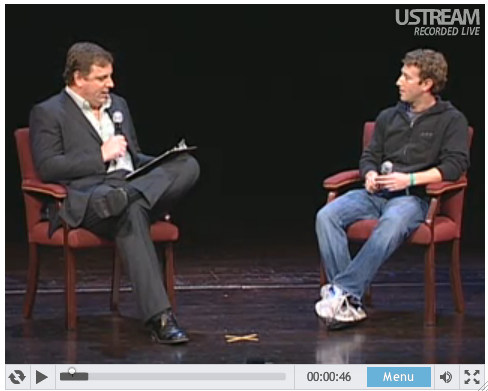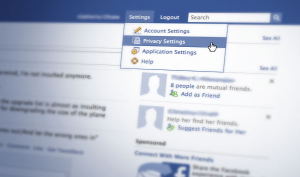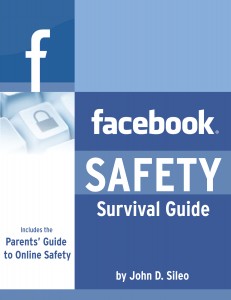Home | You searched for "facebook"
Latest Posts
Understand the new Facebook homepage and know your settings.
The new layout of Facebook’s homepage had some major navigational and privacy setting changes. You may find it harder to find a link that used to be there or find new features that you haven’t seen, but there are some key components to the new Facebook Homepage. As Facebook illustrates in their new homepage tour, there are 6 core components of the new home page: requests and notifications, news feed, bookmarked applications, online friends, account privacy and settings, birthday and event reminders, and Facebook chat.

Take 5 minutes to view the facebook homepage tour and review your privacy settings. While these three settings are very critical, they’re by no means the only privacy settings worth a look. You may think these sorts of items aren’t worth your time now, the next time you lose out on a job because the hiring manager found some inappropriate pictures or saw something inappropriate a friend posted on your wall, you may have second thoughts. But why wait until after a storm to buy an umbrella?
Posted in Identity Theft Prevention, Online Privacy by Identity Theft Speaker John Sileo.
Tags: Facebook, Facebook Expert, facebook privacy, John Sileo, Privacy, Privacy Facebook, safety, social networking

Mark Zuckerberg, CEO of Facebook, was interviewed just last week by Mike Arrington, co-founder of TechCrunch. They discussed privacy and how Facebook is looking to move forward in the future. Zuckerberg made some really interesting comments on Facebook, but I think the most prevalent to Identity Theft would be what he said on the progression of information sharing.
“People have really gotten comfortable, not only sharing more information and different kinds, but more openly and with more people.”
Zuckerberg also said that when Facebook began most people thought: why would I put any information on the internet at all? Now most users don’t think twice about privacy before making posts. Due to the Privacy changes Facebook made in December, your name, profile picture, gender, current city, networks, Friends List, and all the pages you subscribe to are now publicly available information on Facebook. Many people feel that this is a contradiction to what Zuckerberg had said before — that Facebook privacy controls are “the vector around which Facebook operates.” With more than 350 million users on Facebook, privacy is more important than ever.
Posted in Identity Theft Prevention, Online Privacy by Identity Theft Speaker John Sileo.
Tags: Facebook, facebook privacy, facebook privacy expert, John Sileo, Mark Zuckerberg, social engineering expert, social networking
 Tareq and Michaele Salahi — Washington socialites are not just known for their possible roles in the upcoming “The Real Housewives of Washington,” but for being seen arriving at the White House State Dinner. The problem was that they weren’t on the guest list, but managed to work their way inside what is supposed to be the most secure party.
Tareq and Michaele Salahi — Washington socialites are not just known for their possible roles in the upcoming “The Real Housewives of Washington,” but for being seen arriving at the White House State Dinner. The problem was that they weren’t on the guest list, but managed to work their way inside what is supposed to be the most secure party.
The couple took to Facebook to document their party-crashing, and on Wednesday, Michaele Salahi’s Facebook page included photos of the couple at the dinner. The Salahis weren’t exposed until journalists caught sight of pictures showing the Salahis posing with President Barack Obama, Vice President Joe Biden and others. In the aftermath, the security breach looked more like a publicity stunt than a security threat. The Secret Service admitted that they did not verify at each checkpoint that this couple was on the invitation list. In other words, they missed the second cardinal rule of security, Verify.
Posted in Online Privacy by Identity Theft Speaker John Sileo.
Tags: Facebook, identity theft expert, Identity Theft Speaker, John Sileo, Online/Social Media Privacy, social engineering, social networking, White House, White House Party Crashers
 During a time when rules, laws and privacy settings are having trouble keeping up with technology, Facebook is having trouble keeping up with their ever growing population. Recently topping 350 million users, Facebook is scrambling to satisfy them all. Recently, Mark Zuckerberg, the CEO of Facebook, posted an open letter on the website discussing changes to the Facebook privacy setting that they are implementing to help make their users data less public. Take a minute to read the full article and protect your profile.
During a time when rules, laws and privacy settings are having trouble keeping up with technology, Facebook is having trouble keeping up with their ever growing population. Recently topping 350 million users, Facebook is scrambling to satisfy them all. Recently, Mark Zuckerberg, the CEO of Facebook, posted an open letter on the website discussing changes to the Facebook privacy setting that they are implementing to help make their users data less public. Take a minute to read the full article and protect your profile.
Order your copy of the Facebook Safety Survival Guide to make sure you and your children are protected online.
John Sileo became America’s leading Identity Theft Speaker & Expert after he lost his business and more than $300,000 to identity theft and data breach. His clients include the Department of Defense, Pfizer and the FDIC. To learn more about having him speak at your next meeting or conference, contact him by email or on 800.258.8076.
Posted in Identity Theft Prevention, Online Privacy by Identity Theft Speaker John Sileo.
Tags: Facebook, identity theft expert, Identity Theft Prevention, John Sileo, Mark Zuckerberg, Online/Social Media Privacy, Privacy Settings, social networking
In a New York Times Magazine article entitled Facebook Exodus, Virginia Heffernan questions whether Facebook users are losing interest like kids lose interest in a new toy. Heffernan cites the reasons her friends are defecting:
- It makes us too nosy, too focused on other people’s dirt (our “friends”)
- Some fear stalkers
- Some feel their privacy is being compromised
- Some disappear without a word
In addition to this, I would add:
- It takes a lot of time away from real-life interactions
- We remember why we weren’t in touch with those old friends from high school – they wouldn’t even talk to me then!
- People are tired of having more of a relationship with a screen than an actual human
- It encourages others to talk about you in an open forum, which is fine if everyone loves you
Posted in Identity Theft Prevention, Online Privacy by Identity Theft Speaker John Sileo.
Tags: facebook defection, facebook exodus, facebook privacy
 Facebook privacy has taken a step forward. Last week I wrote about Facebook Safety Tips, as privacy is becoming a key factor in the social networking world. Yesterday, Facebook announced that they would tighten up privacy in response to a set of recommendations made by the Canadian government (Facebook Privacy Announcement).
Facebook privacy has taken a step forward. Last week I wrote about Facebook Safety Tips, as privacy is becoming a key factor in the social networking world. Yesterday, Facebook announced that they would tighten up privacy in response to a set of recommendations made by the Canadian government (Facebook Privacy Announcement).
Here is the gist of the Facebook Privacy Changes that will be implemented in the next 12 months:
Posted in Online Privacy by Identity Theft Speaker John Sileo.
Tags: facebook privacy, Facebook Safety
Facebook safety has a direct correlation to your business’s bottom line.
Facebook, and social networking sites in general, are in an awkward stage between infancy and adulthood – mature in some ways, helpless in others. On the darker side of sites like Facebook, LinkedIn and Twitter, scammers and identity thieves are drooling at the sight of this unchecked data playground. In contrast, most social networkers are addicted to all of the friendships they are creating and renewing.
There is no denying that Facebook and other social networking sites have a very luring appeal. You can sit in the comfort of your own home and suddenly have a thriving social life. You can look up old friends, make new ones, build business relationships and create a profile for yourself that highlights only your talents and adventures while conveniently leaving out all your flaws and troubles. It is easy to see why Facebook has acquired over 200 million users worldwide in just over five years. Which is why Facebook safety is still so immature: Facebook’s interface and functionality has grown faster than security can keep up.
Unfortunately, most people dive head first into this world of social connectedness without thinking through the ramifications of all the personal information that is now traveling at warp speed through cyberspace. It’s like being served a delicious new drink at a party, one that you can’t possibly resist because it is so fun and tempting and EVERYONE is having one. The downside? Nobody is thinking about the information hangover that comes from over-indulgence: what you put on the Internet STAYS on the internet, forever. And sometimes it shows up on the front page of the Wall Street Journal, in the hands of a prospective employer or your boss’s inbox. All of the personal information that is being posted on profiles — names, birth dates, kids’ names, photographs, pet’s names (and other password reminders), addresses, opinions on your company, your friends and your enemies — all of it serves as a one-stop shop for identity thieves. It’s all right there in one neat little package and all a scammer has to do to access it is become your “friend”.
Follow these Five Facebook Safety Tips and save yourself the trouble…
5 Facebook Safety Tips
Facebook Safety Tip #1: If they’re not your friend, don’t pretend. Don’t accept friend requests unless you absolutely know who they are and that you would associate with them in person, just like real friends.
Facebook Safety Tip #2: Post only what you want made public. Be cautious about the personal information that you post on any social media site, as there is every chance in the world that it will spread beyond your original submission. It may be fun to think that an old flame can contact you, but now scammers and thieves are clambering to access that personal information as well.
Facebook Safety Tip #3: Manage your privacy settings. Sixty percent of social network users are unaware of their default privacy settings. Facebook actually does a good job of explaining how to lock your privacy down (even if they don’t set up your account with good privacy settings by default). To make it easy for you, follow these steps:
- Spend 10 minutes reading the Facebook Privacy Policy. This is an education in social networking privacy issues. Once you have read through a privacy policy, you will never view your private information in the same way. At the point the privacy policy is putting you to sleep, move on to Step 2.
- Visit the Facebook Privacy Help Page. This explains how to minimize all of the possible personal information leakage that you just read about in the privacy policy. Once you understand this on one social networking site, it becomes second nature on most of the others.
- Now it is time to customize your Facebook Privacy Settings so that only information you want shared, IS shared. This simple step will reduce your risk of identity theft dramatically.
Facebook Safety Tip #4: Keep Google Out. Unless you want all of your personal information indexed by Google and other search engines, restrict your profile so that it is not visible to these data-mining experts.
Facebook Safety Tip #5: Don’t unthinkingly respond to Friends in Distress. If you receive a post requesting money to help a friend out, do the smart thing and call them in person. Friend in Distress schemes are when a thief takes over someone else’s account and then makes a plea for financial help to all of your friends (who think that the post is coming from you). As with all matters of identity, verify the source.
Following these 5 Facebook Safety tips are a great way to prevent an information-sharing hangover.

The best way to protect you and your children from Online threats is to educate yourself about Facebook, Twitter, MySpace and other online social networking utilities. We recently published the Facebook Safety Survival Guide (with Parents’ Guide to Online Safety) with that exact goal in mind. Social networking is immensely powerful and is here for the long run, but we must learn to harness and control it.

John Sileo is the award-winning author of Stolen Lives, Privacy Means Profit and the Facebook Safety Survival Guide. His professional speaking clients include the Department of Defense, the FTC, FDIC, Pfizer, Prudential and hundreds of other organizations that care about their information privacy. Contact him directly on 800.258.8076.
Posted in Online Privacy by Identity Theft Speaker John Sileo.
Tags: Facebook, Facebook Safety, linkedin, Must Read, Online/Social Media Privacy, Privacy, social networking, twitter

Is there such a thing as
Facebook Privacy? Or Twitter, LinkedIn or any other social networking/media sites? I’m not convinced that any of us really know the answer yet. I think we so-called privacy experts talk a big game, but the subject is still maturing, and definitely up for debate.
Who owns the data on Facebook? Who has access to the information stored in the Cloud? Are your Tweets admissible in court?
Join us in the debate as Mike Spinney of the Ponemon Institute and I host a seminar on Social Media’s Impact on Corporate Privacy next Thursday, August 13 from 9:00-9:45 a.m. Mountain Time. The Webinar is geared to anyone whose personal or business information is at risk of social media leakage. We’d love to hear your opinions, questions and comments.
The format will be casual and we will be discussing the following topics (time permitting):
Posted in Online Privacy by Identity Theft Speaker John Sileo.
Tags: facebook privacy, Online/Social Media Privacy

Honestly, we don’t know yet. There was a time when our voting preferences, our political leanings, our policy choices were our own business. Now they are someone else’s business, quite literally. There are so many stories coming out about Donald Trump’s connections to and collusion with the Russians that it is getting hard to keep these accusations straight. Here’s the latest:
Trump Russia Investigation Update
The key word is help. As in, actively provide information that the Russians may not have been able to discover on their own. “Help” is not a synonym for encourage, appreciate or enjoy.
Without getting too political (because after all, this is a cyber security blog), here are the basics of the Trump-Russia Investigation from a cyber security perspective:
- The Trump campaign had possession of a huge amount of information about American voters from Cambridge Analytica, the data mining firm hired to help collect and use social media information to identify and persuade voters to vote (or not vote), through an activity known as political micro-targeting.
Posted in Cyber Data Security by Identity Theft Speaker John Sileo.
Tags: Cyber Security, Disinformation, Hacking, Russia, Russians, Trump, Trump Russia Investigation


 Tareq and Michaele Salahi — Washington socialites are not just known for their possible roles in the upcoming “The Real Housewives of Washington,” but for being seen arriving at the White House State Dinner. The problem was that they weren’t on the guest list, but managed to work their way inside what is supposed to be the
Tareq and Michaele Salahi — Washington socialites are not just known for their possible roles in the upcoming “The Real Housewives of Washington,” but for being seen arriving at the White House State Dinner. The problem was that they weren’t on the guest list, but managed to work their way inside what is supposed to be the  During a time when rules, laws and privacy settings are having trouble keeping up with technology, Facebook is having trouble keeping up with their ever growing population. Recently topping 350 million users, Facebook is scrambling to satisfy them all. Recently, Mark Zuckerberg, the CEO of Facebook, posted an open letter on the website discussing changes to the
During a time when rules, laws and privacy settings are having trouble keeping up with technology, Facebook is having trouble keeping up with their ever growing population. Recently topping 350 million users, Facebook is scrambling to satisfy them all. Recently, Mark Zuckerberg, the CEO of Facebook, posted an open letter on the website discussing changes to the  Facebook privacy has taken a step forward. Last week I wrote about
Facebook privacy has taken a step forward. Last week I wrote about 

 Is there such a thing as Facebook Privacy? Or Twitter, LinkedIn or any other social networking/media sites? I’m not convinced that any of us really know the answer yet. I think we so-called privacy experts talk a big game, but the subject is still maturing, and definitely up for debate.
Is there such a thing as Facebook Privacy? Or Twitter, LinkedIn or any other social networking/media sites? I’m not convinced that any of us really know the answer yet. I think we so-called privacy experts talk a big game, but the subject is still maturing, and definitely up for debate.








